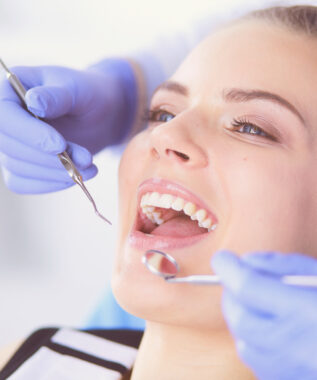 When something troublesome occurs with your oral health, it’s typically best to address the concern as soon as possible with appropriate dental treatment. Otherwise, the consequences of it can grow worse, and the extent of your treatment can grow more intensive. In the case of gum disease, this is especially true, as severe gum disease is the leading cause of adult tooth loss and a significant factor in several other systemic health risks. Today, we take a closer look at why you shouldn’t allow gum disease to get worse if you notice its presence, or if your dentist detects it during your routine dental checkup and cleaning appointment.
When something troublesome occurs with your oral health, it’s typically best to address the concern as soon as possible with appropriate dental treatment. Otherwise, the consequences of it can grow worse, and the extent of your treatment can grow more intensive. In the case of gum disease, this is especially true, as severe gum disease is the leading cause of adult tooth loss and a significant factor in several other systemic health risks. Today, we take a closer look at why you shouldn’t allow gum disease to get worse if you notice its presence, or if your dentist detects it during your routine dental checkup and cleaning appointment.
How gum disease first develops
Gum disease is caused by harmful oral bacteria that form plaque along your gum line. Some of these bacteria can work their way underneath the gums and form plaque on your teeth roots, where you can’t brush and floss it away. Before long, this plaque will calcify into tartar, and the infection in your gums that the bacteria cause results in the beginning stage of gum disease (known as gingivitis). In the earliest stages of gingivitis, you may be able to prevent any damage to your gum tissues with the help of scaling and root planing, or periodontal cleaning, to remove the bacteria from underneath your gums.
The damage it does as it progresses
When gum disease first develops, the symptoms that you might notice can include redness, swelling, and bleeding in your gum tissues. These symptoms may not seem serious at first, but they indicate the beginning levels of damage that gum disease can cause to your periodontal tissues and the foundation of your smile. As gum disease progresses, it erodes the gum tissues that surround your teeth, which can make your teeth loose as they lose some of their support. In more severe cases, it can also erode your jawbone structure, making tooth loss imminent. The inflammation that’s associated with severe gum disease may also become a risk factor in your systemic health, raising your risks of developing other chronic inflammatory disease, such as cardiovascular disease.
Recovering from severe gum disease
When your gum disease is allowed to grow more severe, you may still recover from it, though it will take more than it would if you address it early. For example, severe gum disease is often accompanied by the loss of one or more teeth. In addition to restoring your healthy gum tissues, you may also need treatment to replace the teeth you’ve lost, such as with a dental implant restoration.
Learn more about controlling gum disease
Gum disease can become a threat to your oral health and systemic wellbeing if it isn’t treated and controlled promptly. To learn more, schedule an appointment with us by calling Dreem Dentistry in Leawood, KS, today at 913-681-5500. We also serve patients who live in Overland Park and all surrounding communities.






